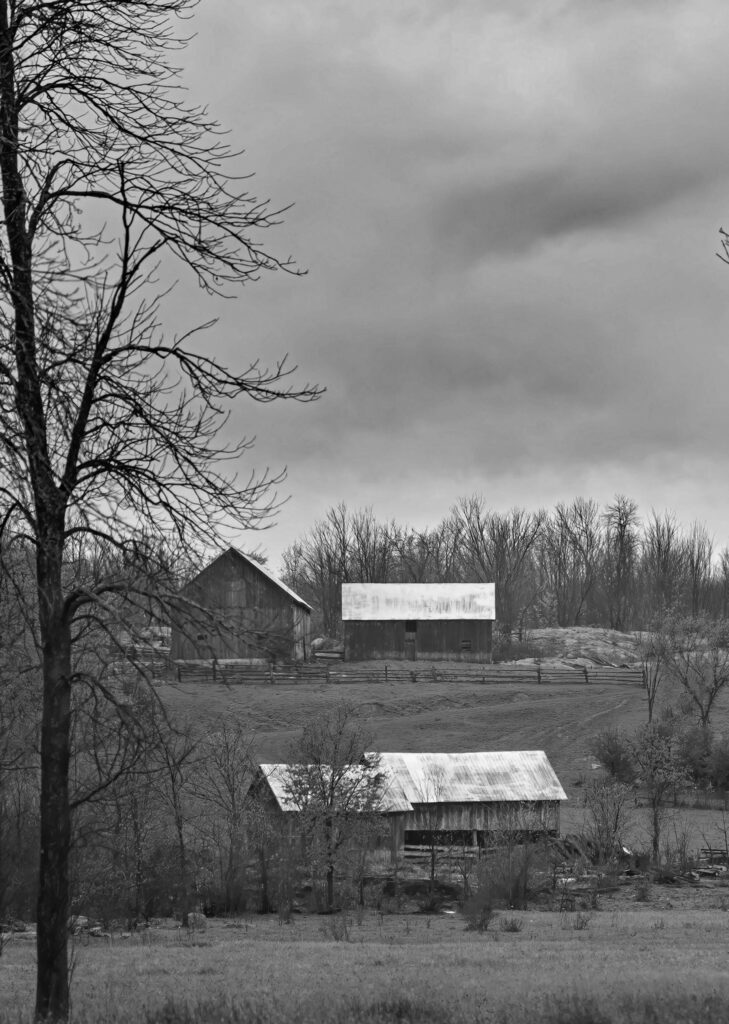If you want to understand the real Canada, observes a character in Jim McEwen’s invigorating debut novel, a good place to start is Wing-nite Wednesday in any small town, including the eponymous Fearnoch, a once thriving, now collapsing farming community in the Ottawa Valley. There — at the local pub, some dank hotel bar, the smelly arena locker room, or the convenience store where you can still rent DVDs — you’ll encounter this real Canada, where everyone says “G’day” and you never have to look for a parking spot. A Canada of Labatt 50, of beer league hockey and gas station subs, of boot-cut jeans and hunting gear, of rusting hay rakes and decaying barns. A Canada gradually sinking under the weight of its own progress.
This Canada, the one of Jim McEwen’s Fearnoch, is both encompassing and particular. It is a place but also a state of mind — one that the author portrays with astonishing vividness and with an affection for his characters, warts and all. Somewhat reminiscent of Richard Russo and Barbara Gowdy, the novel is funny and sad, obscene and sublime, full of poetry conjured from the utterly mundane. Its sentences loop and meander, tumble and cascade like a spring brook rushing through a cow pasture. Based on the eastern Ontario town of Dunrobin, where the author grew up, Fearnoch is a place “with swamps and dead farms and dead elms hanging over the rusted Quonset huts, and lawns uncut around ancient satellite dishes and umbrella drying-racks.” Someone once described it as “a cousin-fucking colonial cow-shit-hole.” Poetry indeed.
With only a glimmer of plot but plenty of action, the story revolves around four former high school buddies facing the gradual dissolution of their youthful expectations and the dismantling of the world they were born into. John Younghusband is the sixth in a long line of John Younghusbands to farm the grudging valley soil. Mikey lives above his parents’ garage, struggles with depression, and works at the local dump. Anna has escaped to Montreal, where she’s both a waitress and a youth-care worker. And Kirby has returned to Fearnoch in spite of the childhood trauma he endured there. The adventures of these four — with their wives and boyfriends, hockey games, drunken birthday celebrations, community meetings, escaping livestock, and pizza parties — unfold in a swooping, tangled narrative that slides seamlessly from one consciousness to the next with Virginia Woolf dexterity.
Passionate but full of angry conservatism, John shares a deteriorating homestead with his wife, Polly, along with his cherished father and five-year-old son. He despairs for the young boy’s future — imagining “a middle-aged Johnny, fat, staring into space with pleated khakis and a goatee and an ID badge on a lanyard, surrounded by humming glowing photocopiers in a business park”— and frets about the persistent ache in his scrotum that conjures the horrors of a pig castration he witnessed as a child.

A spirited take on rural Ontario.
Jim Cumming; Alamy
Mikey, a stutterer, is crippled by a profound sensitivity to his own sorrows and those of the world. He grieves for the loss of Mrs. MacPherson, his cat, named after the school secretary who helped him when he barfed on the bus in grade 1. He experiences incurable compassion for Anne Frank, “a story that’s sadder and sadder, forever.” He has long tried to blunt his feelings with copious infusions of drugs and alcohol. Now, precariously, he limits himself to two beers a day.
In Montreal, Anna searches for beauty on the streets and for virtue in her boyfriend — a poet who can’t even operate a snow shovel — as she revises the detective novel she’s writing, a mystery that refuses to reveal who did it. Why? “Because,” she says, “we don’t deserve the truth!” At the same time, she devotes herself to saving Ebenezer, a seventeen-year-old Haitian boy, from the life of crime that awaits him.
Kirby, meanwhile, has returned to Fearnoch with Peace, his West Coast hippie wife, and with dreams of getting back to the land, of changing the world and having babies. But Kirby and Peace find themselves stuck in a banal suburb on the edge of town, while she miscarries and he’s mired in the bureaucratic quicksand of his job at Human Rights and Complaints Authority Canada.
When Mikey was in a bad mood, a sour, sour mood, when he drove through fields awakening in purple and dew, spun full of wet spiderwebs, and the barn swallows dipping around, flirting with each other with the sun rising up their wings, the long shadows stretching off the bales, while he himself was on his way to sweat all day at the dump, he tried as an exercise to remind himself of all the other people who had, as he saw it, been through much worse. People get spina bifida. They get attacked by pirates. Mikey considered pirates.
Even minor characters are portrayed with razor-sharp acuity. Yvette, for example, an aging francophone waitress in the café where Anna works part-time, carries herself “straightforward and proud through the thankless universe, her pencil behind her ear, her heart disease, glasses on a chain, licking her thumb and stabbing the receipts on the spike.”
In the end, the thankless universe finishes off Fearnoch with epic finality: a tornado (like the real-life one that touched down in Dunrobin in 2018) decimates the town. Nevertheless, despite the wreckage, John, Anna, Mikey, and Kirby come close to finding what they’ve been searching for. In probing Fearnoch’s squalor and his characters’ failures, McEwen has revealed the irresistible greasy heart of those Wing-nite Wednesdays. And in this Canada, love, as sentimental as it sounds, is the hottest sauce of all.
Cecily Ross is an editor, novelist, and poet in Creemore, Ontario.

